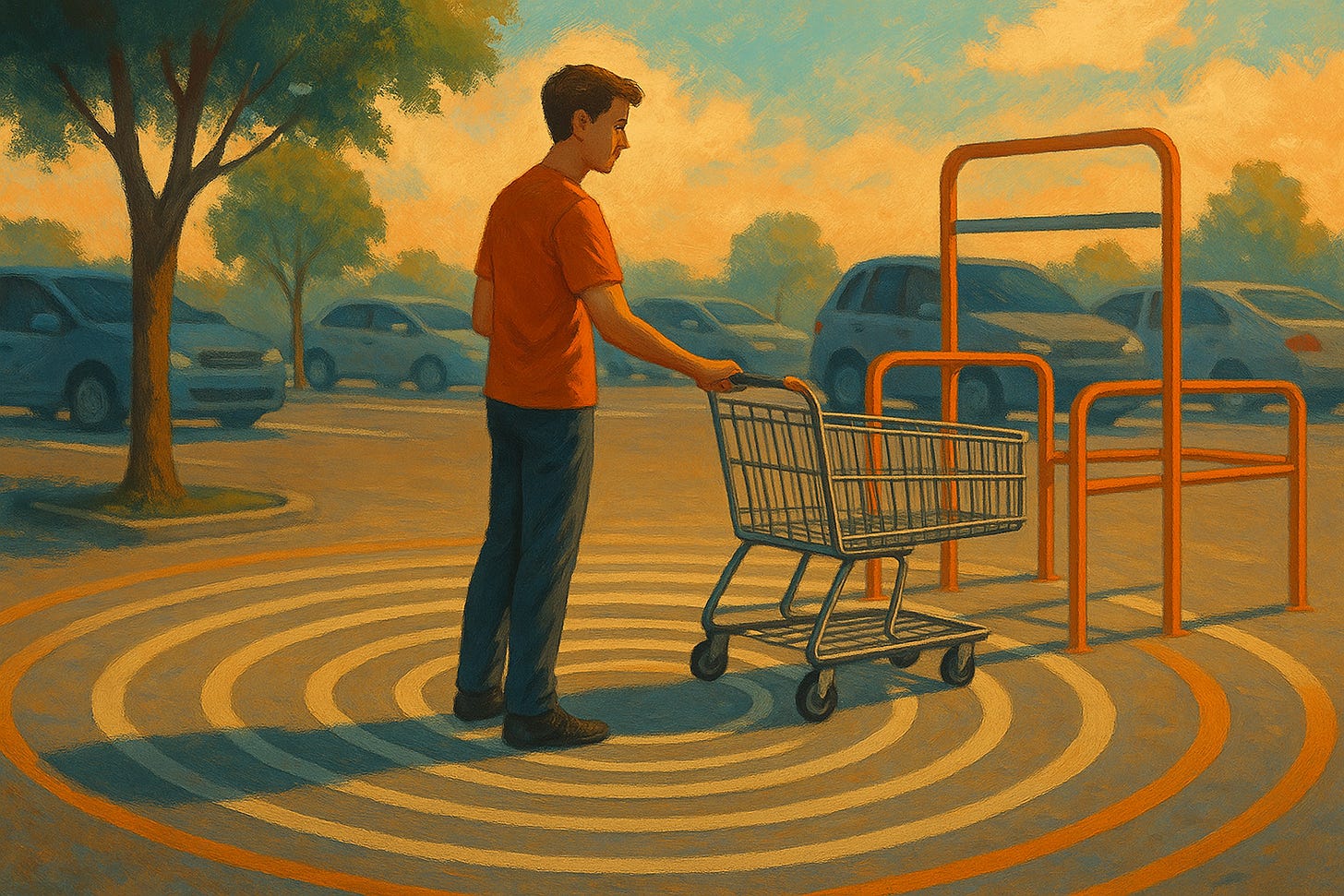The Shopping Cart Technique
Making the right choice the easy choice.
Great things are not done by impulse, but by a series of small things brought together.
Vincent Van Gogh
In 2020 a viral question briefly took over the internet: do you return your shopping cart?
The question is a test to evaluate someone’s character. If we return our carts, we’re a good person and if we don’t, we’re not. It’s a simple evaluation of what we do when no one else is watching.
Despite the question’s simplicity, there is a lot more going on below the surface. Many people chimed in online with countless different reasons why they couldn’t or even shouldn’t return their shopping carts, and instead leave them scattered across the parking lot for someone else to clean up.
If we don’t return our shopping cart it doesn’t mean we’re morally corrupt, but returning our cart is clearly the “right” thing to do.
There are countless micro decisions that we make every day that have the same sense of morality built into them. Going to the gym or sleeping in. Spending an extra hour on our work to make sure it’s great instead of good. Calling our parents or friends in the car instead of listening to a podcast.
These tiny decisions are what collectively define our lives. What if instead of focusing on why it’s justified for us to do the easy thing, we focused on making the right thing the easy choice?
Parking next to the cart return
If we don’t intentionally try to make the right the easy choice, we default to our evolutionary wiring to expend as little energy as possible.
We can always choose to do the right thing, but it takes a significant effort and a non-trivial amount of our discipline and willpower.
If we want to consistently make the right choice without depending on willpower, we should focus on making the right choice as easy as possible, rather than using our energy to overcome the obstacles that make it difficult.
If we want to make it easy to return our shopping cart then we should park next to the cart return. This makes the right choice easy and the decision to park next to the cart return requires a lot less effort than the decision to walk across the parking lot to return our carts after an hour of grocery shopping.
We still have to do the work
We can perfectly optimize everything, but we still have to do the work. Even if we use millions of dollars to make everything that’s important easy, convenient, and effortless, we still need to actually do it and that will always be the hardest part.
Before we do something it’s like we’re standing on the edge of a cliff and we have to jump off. It feels safe where we are and we’re jumping into the unknown.
However, once we make the leap, it’s never as bad as we thought. In fact, we usually feel better afterwards and laugh at ourselves for avoiding what we always knew would be rewarding.
We should focus our energy on making doing the right thing as easy as possible. We can make a world of difference if we put the right thing on the path of least resistance, but the most important thing will always be execution.
At the end of the day, it’s not about how we return our shopping cart, it’s if we return our shopping cart at all.
Prompts
What is the most common decision you face between the easy choice and the right choice?
How can you make the right choice easier?
Have you ever over-optimized trying to make something easy that you’ve lost sight of actually doing the work that matters?
Deep Dive
The Willpower Instinct by Kelly McGonigal
A deep dive into willpower and how it works.
Thanks for reading! I’ll see you next Sunday.
Kevin




"If we want to consistently make the right choice without depending on willpower, we should focus on making the right choice as easy as possible, rather than using our energy to overcome the obstacles that make it difficult"
I really enjoyed this piece. This was a particularly insightful point. Especially when you consider that once one develops the muscle for certain choices, it becomes easier to act upon them.
This is coming from someone who still picks out her clothes the night before because she is not a morning person, and it makes the routine smoother! This example may not be a moral dilemma, but it shows it's okay to support your pain points instead of trying brute force your way through them.